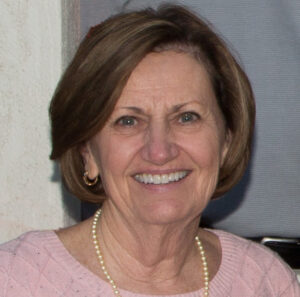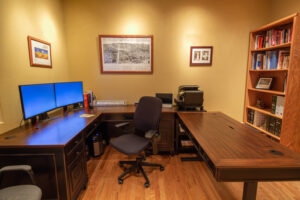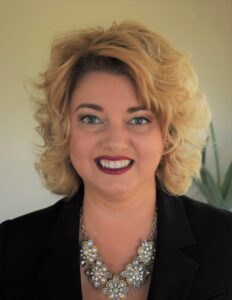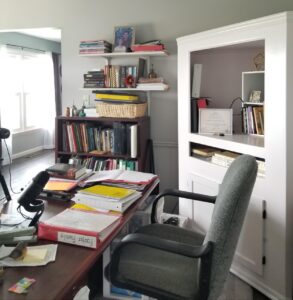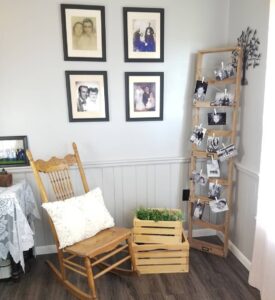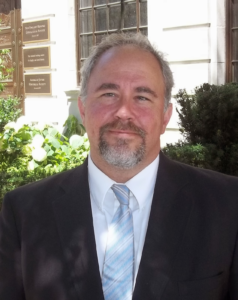Here’s my latest How They Do It interview, this one with author, researcher and instructor Gena Philibert-Ortega, whose focus is genealogy, social and women’s history. She holds a Master’s degree in Interdisciplinary Studies (Psychology and Women’s Studies) and a Master’s degree in Religion. Her published works include two books, numerous articles published in magazines and online, as well as five editions of the Tracing Your Ancestors series from Morsehead Publishing. Gena has presented to diverse groups worldwide including the Legacy Family Tree Webinar series. Her current research includes women’s repatriation and citizenship in the 20th century, foodways and community in fundraising cookbooks, and women’s material culture. I love her focus on women, as well as the confluence of genealogy and food in Gena’s work. Enjoy!
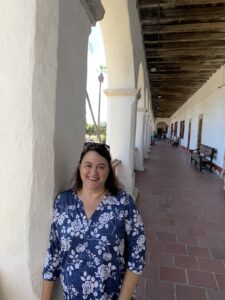 How They Do It: Gena Philibert-Ortega
How They Do It: Gena Philibert-Ortega
How long have you been doing genealogy?
Professionally for a little over 20 years. But I’ve been in love with family history since I was a child. My maternal grandmother was family historian and she told me stories of our family and it intrigued me. I’ve always loved mysteries.
What’s your favorite thing about being a genealogist?
Research. I love research. My favorite place to be is a library, archive, or museums. I like asking questions and finding the answers in records.
What’s your biggest challenge when it comes to organizing your genealogy?
Since I have been doing genealogy since pre-Internet days I have a lot of paper and then I have all the computer files. Plus, I have the genealogy paper collections of several relatives that I have inherited. So organizing all that is a challenge.
What is your favorite technology tool for genealogy?
My iPhone. It’s the one must-have tool I use whenever I research. It’s always with me and it can do the work of several stand-along tools (camera, scanner, paper and pencil). I use it to take notes, email, search online catalogs, refer to my online family tree, and take photos of books and documents.
If you were starting out new as a genealogist what would you do differently?
I know most genealogists answer that they wish they would have kept better source citations. I can relate to that but I really wish I would have done a better job writing up narratives and research logs. I entered information into my genealogical program but I didn’t do a great job of noting what I knew, what I didn’t find, and what my next steps needed to be. I find that older research today and really wish I hadn’t assumed I would remember everything. Isn’t that the biggest lie we tell ourselves? I’ll remember!
Do you keep a research log? If so, what format?
YES! It’s vital. I usually keep it as a simple Microsoft Word Table that I customize according to the project. If it’s a larger project involving various people (related or not) I use a spreadsheet.
How do you keep track of clues or ideas for further research?
I try to use the Research Log or I’ll note it in my genealogy software program.
How do you go about sharing your personal research with cousins or other interested parties?
This is something I’ve been concerned about since I realize I won’t always be around. I’ve been working on making sure everything is online, via an online tree. I also email family with images and pedigree charts/Family Group Sheets. In the past I’ve burned CDs with images and information and have compiled small booklets with images, pedigree charts and short narratives and then gave one to everyone. I did this for a relative’s 50th wedding anniversary. I’m a firm believer that the more people who have a copy of something the better. We never know what can happen to us, our homes, or our “stuff.”
What’s the most important thing you do to prepare for a research trip?
Study the online catalog first. I always go through the catalog and make a list of what I want to look at. I prioritize that list so that the items that I can’t live without have a #1 next to it or the day of the week I want to look at it. I always assume that the unexpected will happen such as getting sick, the repository suddenly closing, or the item you want is lost. I try to build in a day that I haven’t planned anything so that I can use it to chase leads I found on the other days or change course and do something I wasn’t planning.
You waste a lot of time and money by not going through the repository’s online catalog first. You never want to go to a library or archive and find out that that must-have record was digitized and available online since last year.
What’s your biggest piece of advice to genealogists in terms of organizing their research?
Organize it so someone else can understand it. One day my oldest son said something to me that I am always thinking about. “How am I going to know what’s important?” No one wants to inherit a pile of “stuff.” People do want to inherit what’s meaningful. My son had a good point. I have other people’s genealogy, items I’ve purchased at antique stores, and copies of documents I’ve made for articles. It’s not all important and it’s not all about our family. I need to not only organize what I have but do it in a way that he can effortlessly see what is vital to keep and why.
Do you have a dedicated space in your home for doing genealogy research? What’s it like?
I do! (Thank goodness). I have my own office (basically a small bedroom in our home) with my desk, bookshelves, and a filing cabinet (remember I have a lot of paper from decades ago). I also have a more comfortable chair for reading.
Do you have anything to add?
Let’s face it. For most of us, organizing isn’t what gets us excited about genealogy. We like the research, the hunt, the discoveries. BUT without the organization we end up with a pile of papers that no one will look at after we are gone. Organizing is crucial and it’s a great idea to turn to those who are good at it (Janine 😊) to get ideas that work for us. Everyone’s different and you need to choose a system that works for you. Otherwise, you won’t stick with it.
So many wonderful nuggets in this interview! Thank you so much, Gena. I really loved the wise words on the value of organizing our research so that others can understand it and value it when we’re gone. To learn more about Gena, check out her blogs, Gena’s Genealogy and Food.Family.Ephemera, and the articles she writes for the GenealogyBank blog.
